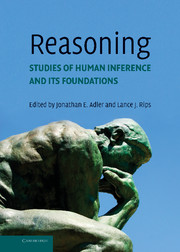Book contents
- Frontmatter
- Contents
- Preface
- List of Contributors
- Introduction: Philosophical Foundations
- PART I FOUNDATIONS OF REASONING
- PART II MODES OF REASONING
- Section 3 Deductive Reasoning
- Section 4 Induction
- 14 Patterns, Rules, and Inferences
- 15 Inductive Logic and Inductive Reasoning
- 16 Reasoning in Conceptual Spaces
- 17 Category-Based Induction
- 18 When Explanations Compete: The Role of Explanatory Coherence on Judgments of Likelihood
- 19 Properties of Inductive Reasoning
- Section 5 Dual and Integrative Approaches
- Section 6 Abduction and Belief Change
- Section 7 Causal and Counterfactual Reasoning
- Section 8 Argumentation
- PART II INTERACTIONS OF REASONING IN HUMAN THOUGHT
- Index
- References
19 - Properties of Inductive Reasoning
Published online by Cambridge University Press: 05 June 2012
- Frontmatter
- Contents
- Preface
- List of Contributors
- Introduction: Philosophical Foundations
- PART I FOUNDATIONS OF REASONING
- PART II MODES OF REASONING
- Section 3 Deductive Reasoning
- Section 4 Induction
- 14 Patterns, Rules, and Inferences
- 15 Inductive Logic and Inductive Reasoning
- 16 Reasoning in Conceptual Spaces
- 17 Category-Based Induction
- 18 When Explanations Compete: The Role of Explanatory Coherence on Judgments of Likelihood
- 19 Properties of Inductive Reasoning
- Section 5 Dual and Integrative Approaches
- Section 6 Abduction and Belief Change
- Section 7 Causal and Counterfactual Reasoning
- Section 8 Argumentation
- PART II INTERACTIONS OF REASONING IN HUMAN THOUGHT
- Index
- References
Summary
Imagine that during an evening while you are out at the theater, your home is broken into and several personal items are stolen. This sudden event, in addition to having practical and possibly emotional consequences, is going to lead to changes in your beliefs and predictions about the future. Whereas you may have previously thought that your home was secure, you may now believe, on the basis of this one event, that it is rather likely that your home will be burgled again.
In the terms of inductive reasoning, you may well see similarities between one case – your home on this particular evening – and future cases – that is, your home on other, future evenings – leading you to project a predicate – being burgled – from the one case to the others. Of course, carrying out this sort of inductive reasoning would be more complicated, because there are the many past cases of evenings on which your home has not been burgled, and these cases too seem to have implications for the future. In addition, other information may be useful, such as whether or not nearby homes have been burgled recently. It seems that due to the similarity in location, knowing the history of other homes would help you to predict the safety of your own home.
- Type
- Chapter
- Information
- ReasoningStudies of Human Inference and its Foundations, pp. 353 - 382Publisher: Cambridge University PressPrint publication year: 2008
References
- 1
- Cited by

